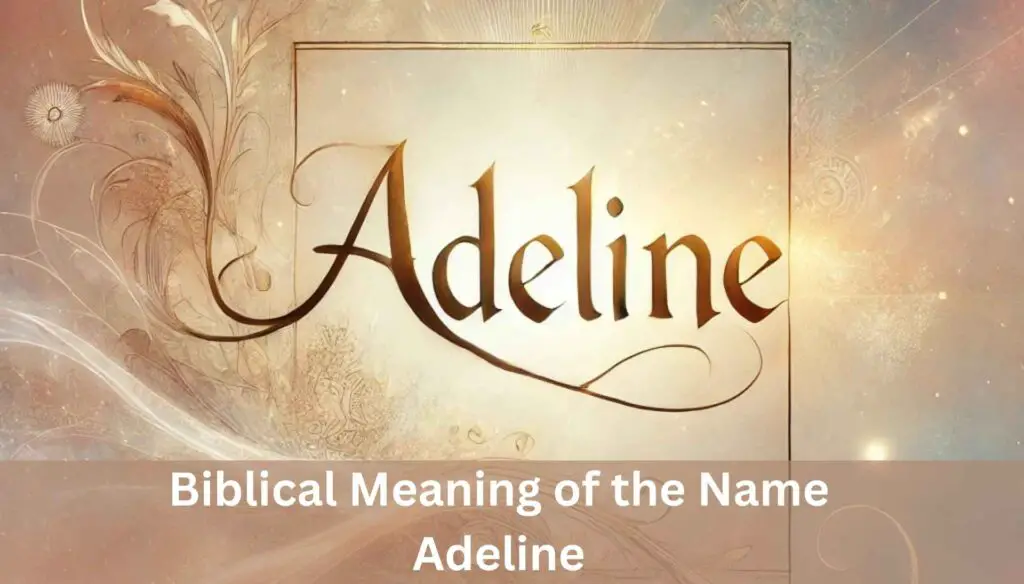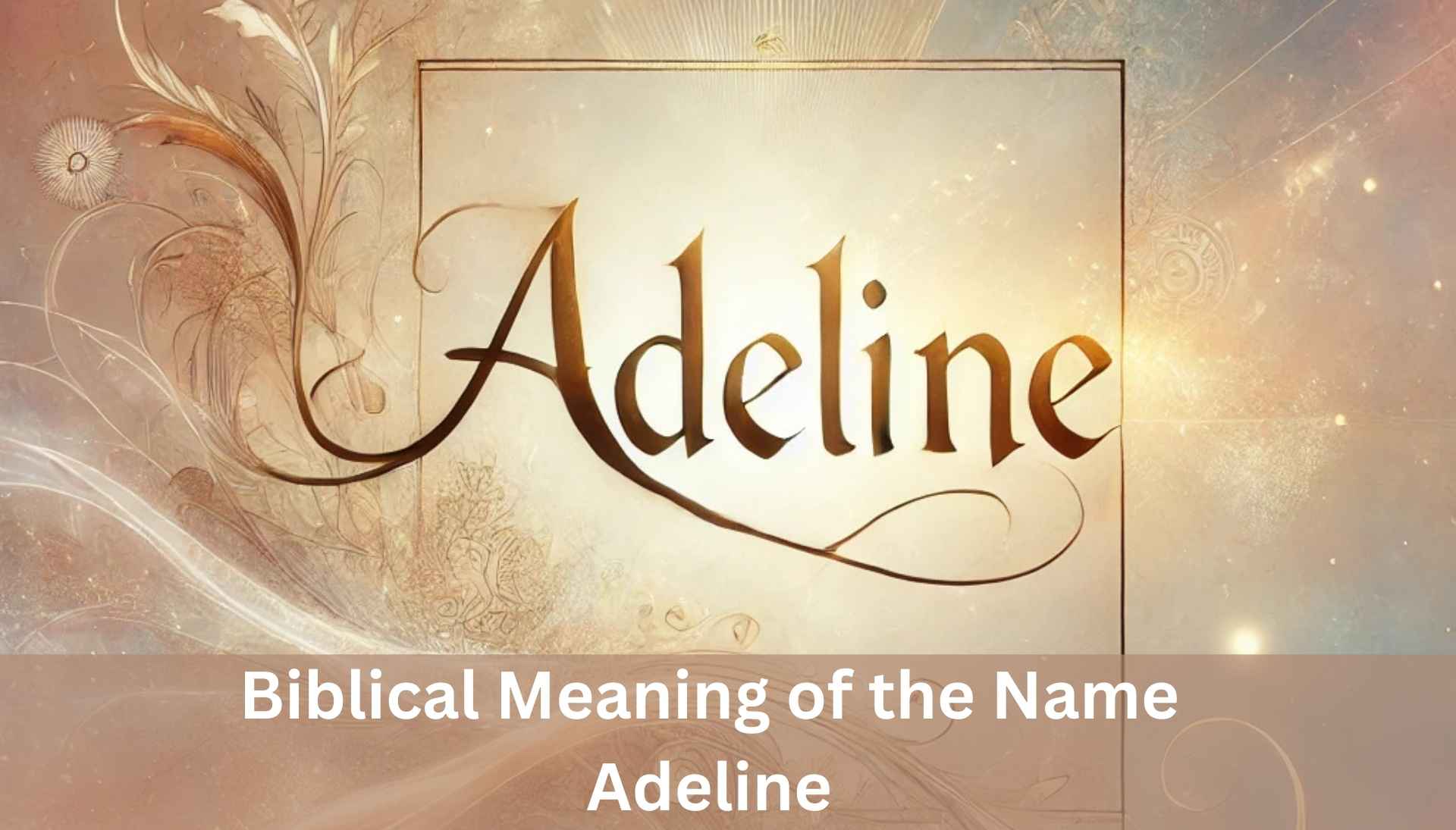The name has German ancestral roots. There, it means “noble” or “nobility,” though it does not appear explicitly in the Bible. It gradually became associated with the Christian virtues, representing grace and a pure heart.
With a vintage charm, Adeline is a favorite among parents who want a name that feels both classic and uplifting. Its meaning speaks to parents who want a name that symbolizes beauty from within as well as the beauty of a good character.
In the pages that follow, we’ll unpack the history, cultural significance, and deeper spiritual and biblical meaning of the Name Adeline below.
What Does Adeline Mean?
 The name Adeline has a rich history of meaning, rooted in nobility and gentleness, stemming from its Germanic origins. It beautifully combines notions of strength and gentleness, offering a compelling blend that resonates with cultural and biblical values of power and humility.
The name Adeline has a rich history of meaning, rooted in nobility and gentleness, stemming from its Germanic origins. It beautifully combines notions of strength and gentleness, offering a compelling blend that resonates with cultural and biblical values of power and humility.
Adeline embodies the spirit of survival, simplicity, and steadfast belief, a spirit that has not been tarnished by time and continues to appeal today.
Origin and Etymology of Adeline
Adeline comes from the Old Germanic roots “adal,” which means noble, and “lind,” which means tender or soft. Etymologically, the name was historically linked to royalty and the noble class in medieval Europe, representing the dignity and moral uprightness.
Through the centuries, Adeline has kept the spirit of those original roots, growing into a name still known for its classic grace and beauty. Yet shaped by Christian values and European culture, the name is arguably better suited to virtues that transcend borders, carrying with it a thoroughly universal appeal.
Common Interpretations of Adeline
Adeline is most often understood to mean noble, gracious, and kind. Across cultures, it is celebrated for representing qualities such as love, humility, and compassion that echo biblical parables.
Spiritually, Adeline represents spiritual development, inner strength, and God’s grace. Its association with biblical qualities like patience, devotion, and grace makes Adeline a name that encourages an attitude of faith.
Authors of characters named Adeline create strong, courageous characters with moral authority. Their kindness deepens this name’s spiritual and ethical heritage. Its current popularity only reinforces its timelessness as a name rich with meaning and virtue.
Is Adeline in the Bible?

The name Adeline is not found in the Bible either. This lack does not diminish its spiritual importance. Names in biblical stories usually indicate character, purpose, or blessing.
Though Adeline has no place in the Bible, the meaning of the name—grace, nobility, divine favor—resonates profoundly with Biblical values.
Direct Mentions in Scripture
Though Adeline is not found, other names that share its meaning glow throughout the biblical narrative, like you might find with Hannah (grace) and Abigail (a father’s joy).
In the Bible, a person’s name is frequently a prophetic marker of their identity and purpose. Be it historical or fictional, for example, Hannah’s story in 1 Samuel speaks of bravery and devotion, qualities we see in Adeline.
Just as in the Bible, so it is now—names often represent more than an identity; they carry spiritual truths or divine purposes. Adeline’s lack of presence in scripture doesn’t negate its emphasis on humility, grace, and steadfastness.
These biblical principles are just as powerful today.
Names with Similar Meanings
Many names share Adeline’s essence of nobility and tenderness:
- Hannah: Grace and favor.
- Sarah: Princess, symbolizing nobility.
- Ruth: Companion, embodying loyalty and kindness.
These names evoke positive qualities praised in the Bible, tying the connection to Adeline still further through the appreciation of similar qualities. Their cultural importance throughout traditions emphasizes the timeless attractiveness of such characteristics.
Symbolic Connections to Biblical Themes
Adeline’s name suggests qualities such as grace under pressure and faithfulness, which are common in biblical women such as Esther or Mary.
Contextually, names such as Adeline serve as constant reminders to reverence the divine virtues—compassion, modesty, and fortitude—that are so deeply rooted in biblical faith.
Exploring Biblical Naming Conventions
 In the biblical cultural context, names were of great importance, and a name was more than just a label. They were frequently selected to embody identity, character, or even destiny, often prominently wrapped up with spiritual and cultural significance. Hebrew, the language of the Old Testament, has given us hundreds of names still used today, many of which hold special meanings, focusing on lineage and connection to the Divine.
In the biblical cultural context, names were of great importance, and a name was more than just a label. They were frequently selected to embody identity, character, or even destiny, often prominently wrapped up with spiritual and cultural significance. Hebrew, the language of the Old Testament, has given us hundreds of names still used today, many of which hold special meanings, focusing on lineage and connection to the Divine.
Names such as Isaac (meaning “laughter”) or Samuel (“God has heard”) were prime examples of this. Naming was, therefore, not an arbitrary act, but an intentional act linked to one’s function or vocation.
Significance of Names in Biblical Times
In the Bible, names served as markers of character and destiny. For example, Abraham’s name was changed from Abram to reflect his covenant with God as the “father of many nations.” This biblical practice of renaming was not without significance, usually marking a divine transformation or new calling.
An example of this is the transformation of “Saul” to “Paul” in the New Testament. Ancestry also plays an essential role in naming, connecting people to their lineage and faith. Names such as David hold profound connections to lineage while representing attributes such as leadership and loyalty.
Cultural Influences on Names
Biblical naming conventions were heavily impacted by cultural context. Continued language evolution further shifted these meanings, with Hebrew and Greek prevailing in the Bible’s naming conventions. Conquests and external influences introduced variations, largely reflecting societal shifts that were the reality of the times.
For instance, the merging of Aramaic and Greek culture during the Hellenistic period severely affected how names were adopted. Names were different between cultural groups in the Bible, showing the diversity of cultural traditions, but even within the Hebrew people themselves.
How Adeline Relates to Biblical Languages
While the name Adeline is not directly from the Bible, it has an enchanting connection to biblical languages. Its evolution as a project and a community speaks to values that echo powerfully in those traditions. Adeline’s Old German form, Adalind, means “noble.”
It later passed into Old French, becoming the name that we today call it. Its essence of nobility aligns with Christian virtues like humility and integrity, reflected in passages such as 1 Peter 2:9. Adeline probably doesn’t come from Hebrew, Greek, or Latin.
Considering its relationship to these biblical languages goes a long way in unlocking its cultural and spiritual depth.
Connections to Hebrew
Hebrew names frequently have deep spiritual meaning related to biblical narratives. Well, here’s the rub—Adeline is not a Semitic language. In Hebrew, the word for noble, אציל, closely relates to Hebrew names that reflect intrinsic divine nature and beauty.
For instance, Melech is Hebrew for “king,” and Aviyah translates to “God is my father.” Hebrew naming practices focus on identity and purpose, rooted in part in the cultural understanding that names shape a person’s spiritual path.
Connections to Greek
Other literature tells us that in Greek culture, names were thought to encapsulate one’s destiny as well as character. Adeline is not a Greek name, but it has virtues that make it suitable alongside Greek names.
For instance, it is etymologically related to the name Aristos, meaning best or noble. The Greek language, pivotal in shaping New Testament texts, often emphasized strength and grace, qualities subtly echoed in the name Adeline.
Connections to Latin
Adeline’s roots dive deeper into Latin traditions, where names classically embodied moral virtues. Latin names like Augustus (‘great’) and Clementia (‘gentleness’) share Adeline’s themes of nobility and tenderness.
This illustrates how language shapes Christian naming practices.
Biblical Figures and Adeline’s Symbolism
The name Adeline has a rich tradition of significance based on biblical concepts of grace, strength, and faith. The symbolism represents the admirable qualities of great women in the Bible. Their lives testify to their resilience, humility, and a deep sense of divine authoritative purpose.

These biblical figures show us the outstanding traits that go along with being an Adeline. They guide us to appreciate their deeper meanings in spiritual and personal landscapes.
Grace and Strength in Biblical Narratives
Biblical narratives primarily teach that grace and strength are the center of virtue. These themes are very much aligned with Adeline’s spirit. Like Esther, we should embody the qualities of courage and faith.
Like all biblical figures, Adeline’s legacy is something to build upon. Her actions, guided by a sense of righteous loyalty and justice, are further underscored by Adeline’s symbolism.
Mary, the mother of Jesus, carries abundant depictions of humility and grace. Her deep obedience to God’s will should inspire all who work in her name. These stories illustrate that grace is more than graciousness.
It is symbolic of a deep, hard strength of faith, something that echoes the much-needed quality in the Christian walk.
Parallels with Biblical Stories
Moreover, the name Adeline aligns with biblical tales of redemption and wisdom. Adah, a more obscure figure, represents the beauty of grace, the notion that true beauty is not only skin deep.
Much like Adeline’s own story, Ruth’s fierce loyalty and steadfast faith in God’s provision add depth to Adeline’s biblical connection to trust and purpose. These stories of biblical figures shape the ways we inspire courage, forgiveness, and faithfulness today.
They inspire people to pursue their God-given calling and experience His grace each moment.
Theological Significance of Adeline
The name Adeline doesn’t appear literally in the pages of scripture. Iof is of profound theological significance because it is a living expression of love and God’s kingdom principles. Its etymology, which comes from “noble,” fits with Christian values of character, humility, and grace.
These qualities reflect God’s call for believers to embody a “royal priesthood,” as referenced in 1 Peter 2:9. The hymn Adeline is not rooted in Hebrew tradition, but it has indeed become popular. Today, it is a powerful, transformative movement within American Christianity.
Virtues Implied by the Name
The virtues associated with Adeline, like kindness and resilience, have Biblical underpinnings. Kindness echoes the fruit of the Spirit in Galatians 5. At the same time, while resilience mirrors the perseverance encouraged in James 1:12, these qualities aren’t just lofty concepts; they’re everyday practices that form a faithful life.
For instance, the gentle nobility associated with Adeline challenges cultural norms that prioritize self-promotion, offering a counter-cultural witness to Christian values. Living these virtues changes the name from an arbitrary choice into a deep and constant reminder of your spiritual quest.
It challenges you to love in truth and lowliness, building on the spirit of the Beatitudes and Beatitude teaching.
Interpretations Across Denominations
Christian denominations tend to emphasize the significance of names in varying ways. For others, Adeline is an embodiment of God’s creative grace and gentleness. Some focus on its lofty ties to the “royal priesthood.”
Despite these differences, the shared focus on spiritual virtues unites interpretations, inspiring believers across traditions to embody the name’s qualities. This vintage charm captures the spirit of staying rooted in Christian tradition, making it a favorite with Christians for its classic vibe that never goes out of style.
Understanding Historical Biblical Texts
These historical biblical texts provide the backdrop for understanding the rich meaning behind names in the Bible. Names carried deep significance in the ancient world, frequently reflecting individual character, God’s intent, or societal ideals.
These texts show us the colorful ways in which names were deliberately chosen to embody one’s identity and future. Even Hebrew names, like the one above – עָדָה (Adah), “ornament” or “beauty” – carry meanings that illustrate beloved aspects of characterization woven throughout biblical stories.
While the specific word Adeline does not come from Hebrew traditions, investigating historical contexts and linguistic roots enriches understanding of its meaning.
References in Commentaries
Biblical commentaries, especially those that focus on ancient near eastern culture, are invaluable in decoding the symbolism behind these names. Scholars such as Matthew Henry and Albert Barnes note that the meanings of names are often crucial to interpreting scripture properly.
Adeline’s character is very much grounded in Germanic folklore. Its components—”adal” (noble) and “lind” (gentle)—embody essential Christian virtues such as humility and grace. This connection is echoed in Matthew 5:5, where Jesus highlights meekness as a blessed trait.
These perceptions will make us look with new eyes upon names such as Adeline, associating them with eternal biblical values.
Scholarly Debates on Name Meanings
Long-standing debates over the meanings of their names continue to be an important topic of discussion among biblical scholars. Others might claim that, although names like Adeline might be non-biblical, they still express ideas in line with what Christians believe.
Some look at how cultural changes affect the trend toward adopting names that sound jaunty and old-timey. These provocative conversations open up the prophetic discipline further to the exciting and profound tensions of historical linguistics and theological discourse, shaping our understanding of identity in biblical texts.
Critical analysis is still vital in connecting historical and modern understandings of the meaning of names.
Grace and Strength in Adeline’s Meaning
Her name, Adeline, has a very deep meaning. It combines grace and strength as core values, embodying ageless biblical teachings. Adeline is a name closely connected to spirituality and morality. Grace, usually connected to themes of modesty and compassion, balances strength, which reflects inner toughness and loyalty.
Combined, these ideas create a rich idea that isity, full of electricity, attracting and connecting to those who want to live with integrity and purpose.
Biblical Themes of Grace
In biblical stories, grace is shown to be a sacred gift that brings new life. Figures like Ruth represent grace in fierce loyalty, respect, and humility. At the same time, Paul’s story illustrates the power of grace to affect deep personal transformation.
Grace and strength are the intangibles associated with the name Adeline, inspiring her bearers to go through this life gracefully. Today, grace remains a cornerstone of spiritual practices, reflecting God’s favor and the ability to extend kindness even in challenging times.
The deeper meanings of Adeline inspire us to look for this grace in our relationships and everyday life.
Biblical Themes of Strength
Strength in the biblical sense is personal power borne of belief and endurance. Examples like Esther’s courage to save her people or David’s resilience in facing Goliath illustrate the power of strength rooted in trust and purpose.
Adeline reflects all of these traits, representing the determination to face adversity by facing life’s challenges with grace and strength. This inner strength, which promotes self-evolution and the advancement of one’s community, speaks to the heart of what having strong faith looks like on any path.
Modern Interpretation of Adeline
The name Adeline, with its beautiful meaning and biblical significance, is steeped in timeless charm and rich heritage. Its journey reflects profound spiritual values, serving as a testament to deep tradition while embracing modern relevance. Today, it stands out as a popular choice, resonating with those seeking noble meaning.
How Meaning Evolved
Historically, Adeline represented qualities of grace, humility, and devotion, making her a perfect fit within the biblical context. Over the years, cultural changes have changed the festival’s identity, mixing its spiritual roots with a more universal cultural vibe.
Modern narratives in films, literature, and music have spotlighted Adeline as a name linked to characters marked by resilience and noble qualities. These representations have incubated Adeline’s cozy cachet, associating it with poise and virtuous vigor.
Cultural shifts have contributed to its popularity. Parents looking for names that combine old-school charm with new-school cool are increasingly turning to Adeline. Its thematic timeliness—grace, humility, faith—definitely resonates today, as it always has, and adds to the timelessness.
Today, it serves as a gateway between historical traditions and recent ambitions, melding spiritual richness with present elegance.
Contemporary Significance
Even in today’s high-tech climate, Adeline still speaks to the highest potential of the human spirit—hope, perseverance, beauty, resilience, and spiritual depth. Its aristocratic splendor continues to appeal to families who appreciate names with weight and depth that tell a story of virtue, benevolence, and fortitude.
Most widely recognized in meanings, over 70% of respondents connect Adeline with nobility and dignity, emphasizing its great charm. What makes Adeline’s modern charm so exciting is its potential to inspire.
It represents ideals of patience and faith. It inspires people to overcome adversity and challenges and harks back to the need for us all to bring a bit of grace with us every day. This history takes it beyond being only a name—it’s a strong symbol of persistent values.
Final Words on Biblical Meaning of the Name Adeline
Adeline holds an understated beauty that links grace and strength together through deep biblical ancestry. Though not explicitly referenced in scripture, the meaning and beauty of Adeline and its symbolism represent eternal and classic values found throughout biblical stories. The name’s deep connections to kindness, resilience, and divine favor cross ancient languages and centuries to find meaning in today’s interpretation. It not only continues the experience of faith, but facilitates a deeper engagement with their faith and personal identity.
Names such as Adeline give testimony to the indelible connection between language and faith, demonstrating the impact of meaning over centuries. Adeline’s story occupies a critical space in history. Visitors love it for its deep spiritual connections and jaw-dropping majesty. If you’re considering it for yourself or someone you love, this name exudes permanent elegance. It speaks to a profound inner power. It’s not just a name — it’s truly a powerful legacy.
Frequently Asked Questions
What is the biblical meaning of the name Adeline?
Adeline, a beautiful name derived from the Germanic Adalheidis, signifies ‘noble’ or ‘nobility.’ While not directly mentioned in the Bible, the name Adeline’s meaning embodies grace and purity, reflecting biblical virtues admired for their strength and spiritual essence.
Is the name Adeline found in the Bible?
Although the name Adeline does not appear in the Bible, its origins and meaning resonate with biblical virtues, reflecting a spiritual journey that aligns with timeless values and moral fortitude.
Does the name Adeline have a spiritual meaning?
Indeed, the name Adeline embodies an ethereal quality of grace, strength, and nobility, reflecting timeless virtues and essential biblical values, making it a powerful name choice.
How does Adeline connect to biblical naming conventions?
Biblical names often carry significant meanings tied to virtues or divine qualities. Embracing Adeline, which means ‘noble,’ aligns beautifully with this tradition, highlighting the spiritual essence of character and grace.
What is the theological significance of the name Adeline?
Theologically, embracing Adeline reflects a beautiful name that signifies elegance and strength, which are timeless virtues in Christian theology. It produces a noble spirit akin to humility uplifted in all scriptural religion.
Are there biblical figures related to the meaning of Adeline?
Though no biblical figures carry the beautiful name Adeline, its meanings of ‘noble’ and ‘graceful’ evoke characters like Ruth and Esther, who exemplify timeless virtues and a steadfast spirit in their biblical accounts.
What is the modern Christian interpretation of Adeline?
Overall, the name Adeline, with its beautiful meaning of noble kind, serves as a powerful emblem of grace and spiritual values in contemporary Christianity, ideal for parents seeking a name that embodies faith and moral fortitude.







